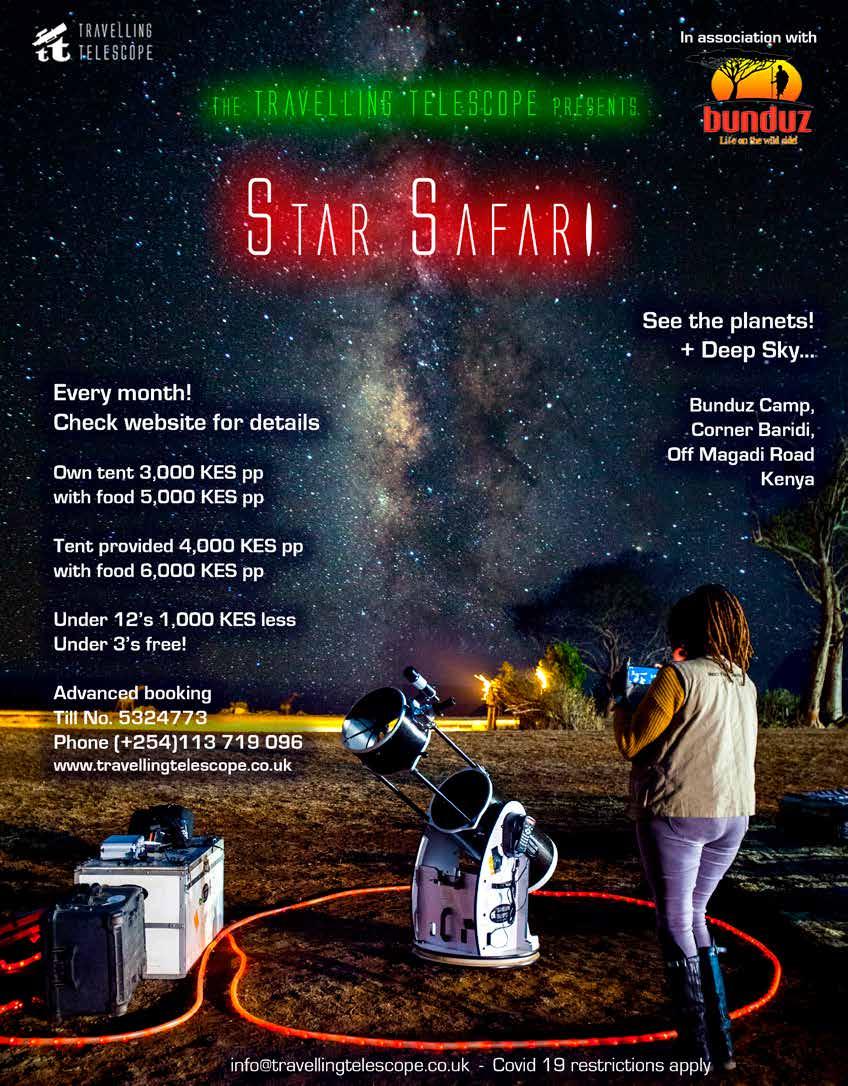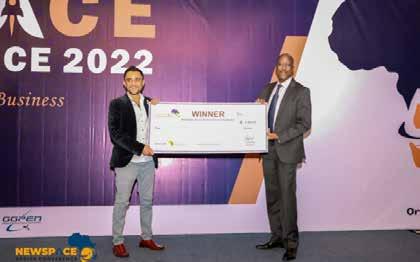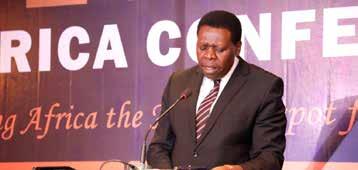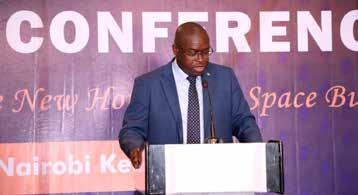
7 minute read
astronomy and storytelling
INDIGENOUS ASTRONOMY & STORYTELLING
By: Unathi Kondile “
Advertisement
A people without the knowledge of their past, origin and cultural heritage are like a tree with no roots,” said renowned storyteller Dr Gcina Mhlophe, who was speaking to a group of pupils, parents and scientists at Emaxulwini Primary School hall in South Africa's Mpumalanga township.
It’s a rainy Saturday morning as we take a taxi from Durban central to Hammarsdale. We hop off at the local Hammersdale Mall and then catch another taxi that drops us straight in front of the primary school where the event is at.
SAAO Sivuyile Manxoyi with Simgaye Sithole who has always wanted to be an astronomer
Mam’ Gcina, through her Gcinamasiko Arts & Heritage Trust, has been working with the Department of Science and Innovation (DSI) and the SAAO for the past few years and has joined them in a number of events such as “Campfire under the stars”. Her pressing interest now is to ensure that young people of today do not lose touch with the culture of storytelling. Her stories are a mixture of isiZulu and how things were done traditionally. The parents can relate, but to the children it is all news. Learning that what they think is new has actually been happening in the past.
As we arrive at Emaxulwini Primary, Sivuyile Manxoyi and Buzani Khumalo of the South African Astronomical
Observatory (SAAO) are wrapping up a chat about Indigenous Astronomy for future generations. The attendees were quite keen to know more about African traditional astronomy; the significance of stars and predicting weather patterns in the past. It was all a science done without astronomers and space scientists. Africans were natural astronomers.
“If you want to change the story, you must change the storyteller!” says Noel Kok, the founder of an organisation called NEWF, which trains African filmmakers and storytellers across the continent. Kok encourages the young learners to check their website newf.co.za for regular updates on film funding opportunities and how to work with them in African storytelling production.
An environmental film is screened before Dr Mhlophe leaps up to the front whilst reciting a poem about young girls carrying wood on their heads. The crowd cheers on with excitement. She is no stranger to this community. She was born in Hammersdale in 1958 and went on to finish her matric at Mfundisweni High School. The pupils and parents simply call her “Mam’ Gcina” as she greets us all and begins to narrate some tales of the night sky. We then sit down with a Hammarsdale community member, Deneo Koloko, who is also the founder and director of a Non-Profit Organisation called Let’s Read Together. Let’s Read Together and Gcinamasiko Arts and Heritage Trust were the hosts of this event at Emaxulwini.
“We wanted attendees to gain knowledge in astronomy and have a clear understanding of what it is and what opportunities exist in astronomy,” explains Koloko, who used her extensive networks to invite high school learners living in Hammarsdale, especially those studying science and mathematics. It was a good turnout as the venue was filled to capacity, with learners at the back sharing their excitement and how some of them had actually wanted to become astronomers.
“We would love for you to leave us with information brochures on which exact science courses we should take to get into astronomy,” said 16-year-old Anelakho (surname withheld).
“Since I got into high school all I ever wanted to study was astronomy, astronomy, astronomy," said another high school pupil, Simgaye Sithole. "And whenever I tell people that I want to study astronomy or astrophysics, they usually ask me what it is and where will I find a job in that. They also ask why I don't study Law or Medicine".

KENYA HOSTS THE NEWSPACE AFRICA CONFERENCE
2022 Previously, our publication highlighted the African space agencies, the satellites they have, as well as how they are necessary for mapping, monitoring natural disasters, surveillance of agricultural production and By: Lusanda Tamesi more. According to studies by Space Generation Advisory Council, a total of
41 satellites have been launched by African states since 2016. Egypt leads the pack with nine satellites launched, followed by South Africa with eight, Algeria with seven, Nigeria with six, and Morocco with three, while Ghana, Sudan, Ethiopia, Angola, Kenya, Rwanda and Mauritius fill out the list.
Space: Africa's next frontier
Space in Africa hosted a three-day conference from 25-27 April 2022 at the Villa Rosa Kempinski in Nairobi, Kenya. Over 100 delegates attended this high-level conference themed "Making Africa the New Hotspot for Space Business." Among those attending were heads of African space agencies as well as leading commercial space companies, investors and other key stakeholders in the African space industry.
From trade and economy, policy and regulatory framework, innovation and technology are conversations that surrounded the centre of what Africans plan to do in the business space domain. This hybrid event was welcomed by Eugene Wamalwa, Cabinet Secretary for Defence of Kenya. As he welcomed the delegates both in-person and virtually, he also appreciated the work that has been put in place by African countries in the space industry and how the space business is important in Africa. In addition, he expressed his gratitude for Kenya being selected as the host country for the maiden edition of the conference. Adding that Kenya’s interest in space dates back to 1964.
Wamalwa hoped that Kenya would inspire new space start-ups and urged policymakers to facilitate this development across the continent. The Cabinet Secretary declared the NewSpace Conference open. The first event's keynote speech address was by Dr Tidiane Ouattara, the African Union Commission Space Science Expert and GMES and Africa Programme Coordinator where he admired the nature of Africa and that Africa was more than a hotspot for space business. According to him, space can provide accurate information for important decisions on the continent while simultaneously becoming a distributor and developer of space services. He added, saying that the policy makers should look more on the necessity to improve the local private sector.
One of the panel sessions that stood out was the fourth panel session on addressing the talent gap in the African space industry, where Dr Taiwo Tejumola – an assistant Professor of Space Systems Engineering at the International Space University – discussed developmental needs that Africans could tackle collectively saying that: “Infrastructure development for training and research must be expanded for socio-economic benefits of space technology. And that people with certain attributes or talents should match their field of study!”
Also, Paul Baki, professor of Physics and Consultant Space Scientist, Technical University of Kenya focused more on Africa’s 2063 agenda on economic growth – a need to invest in capacity development and more.
Day 2:
Like any other business, space has laws and regulations. A continuation of the framework and discussions from the first day of the conference marked the second day of the conference. Chancellor of International Space University and former CEO of South African National Space Agency (SANSA), Val Munsami, spoke on defining the space ecosystem. Munsami stated that everything in the space ecosystem is based on space laws, policies and strategies. He added on by saying that the failure or success of the space ecosystem depends on these factors.

The heads of space agencies gave an overview of what developments have been achieved by their space agencies. In this session each agency had the liberty to showcase what space development and business meant in their countries.
Day 3:
The first panel session focused on issues (problems and opportunities) regarding doing business within the African space industry. Anna Aikohi, Head of Analytics at Space in Africa, led the discussion.

The third and final day of the conference started with a keynote speech from Dr Ayman Ahmed who delivered his speech virtually. In this session, Dr Ahmed focused his discussions on projects that the Egyptian Space Agency (EgSA) were undergoing. This was followed by a heads of space agency panel. Dr Painos Gweme, Coordinator of the Zimbabwe National Geospatial and Space Agency (ZINGSA), then discussed how the space science can be used to foster research in geospatial science and earth observation. Furthermore, his agency works to bridge the connectivity gap in Zimbabwe. A conference would not be a conference without celebratory cuisine. The last day of the conference ended off with a dinner. The winner of the NewSpace Africa Startup Pitch Competition was Ignitos Space Zambia. The vote of thanks was given by Temidayo Oniosun, Managing Director of Space in Africa.

Exciting African developments
Uganda to launch its first satellite, the PearlAfricaSat-1 (an earth observation satellite); Zimbabwe to launch its first satellite, ZIMSA-1, 1U (an educational and amateur radio mission cubesat manufactured by Japan’s Kyushu Institute of Technology); AngoSat-2 is an Angolan satellite that is now ready for launch.










